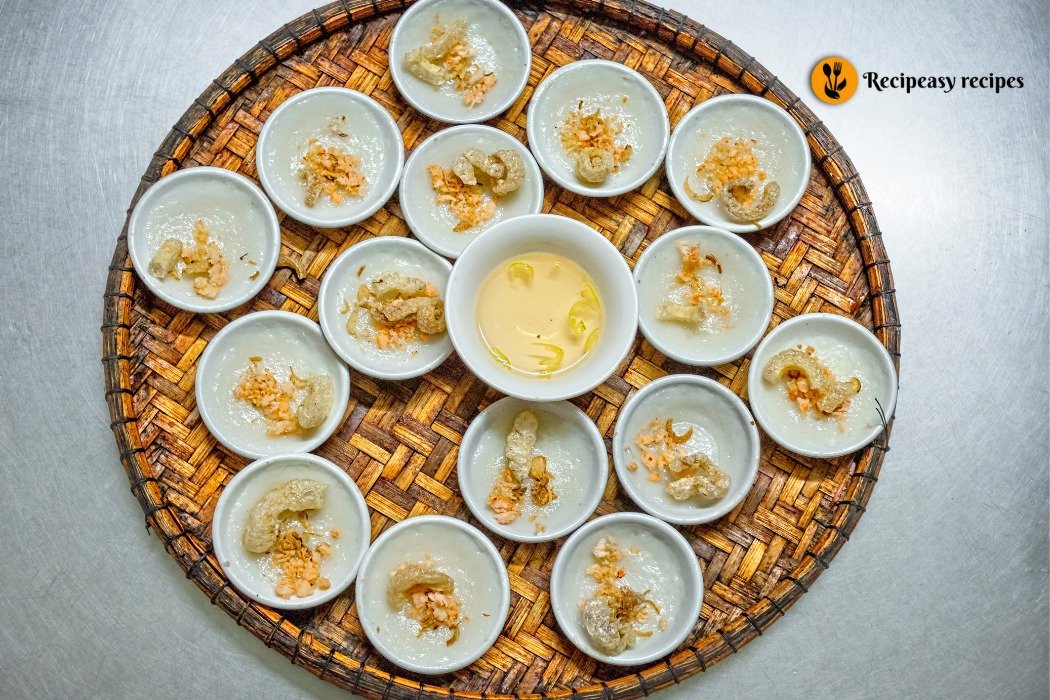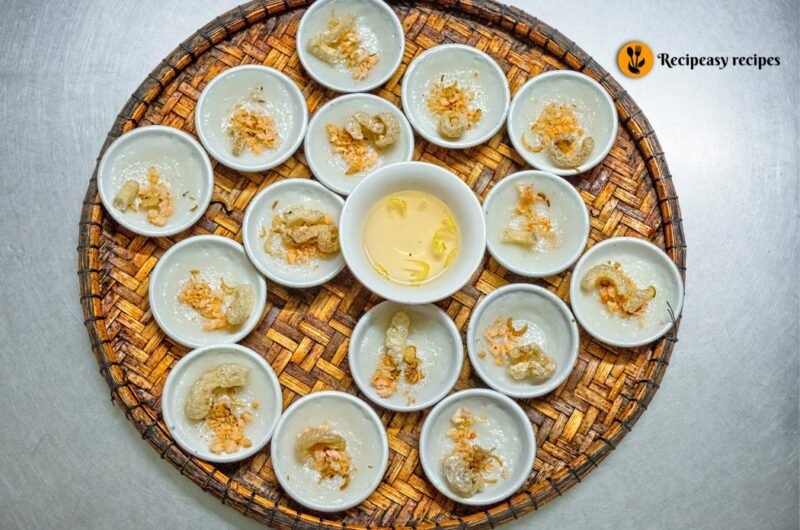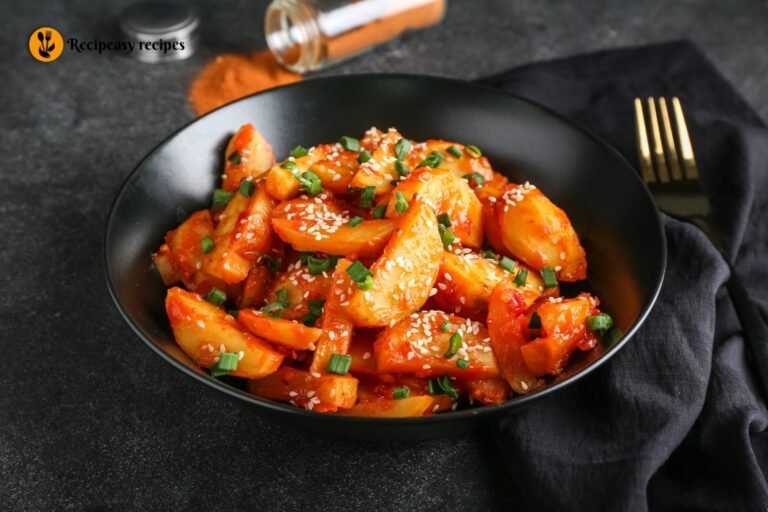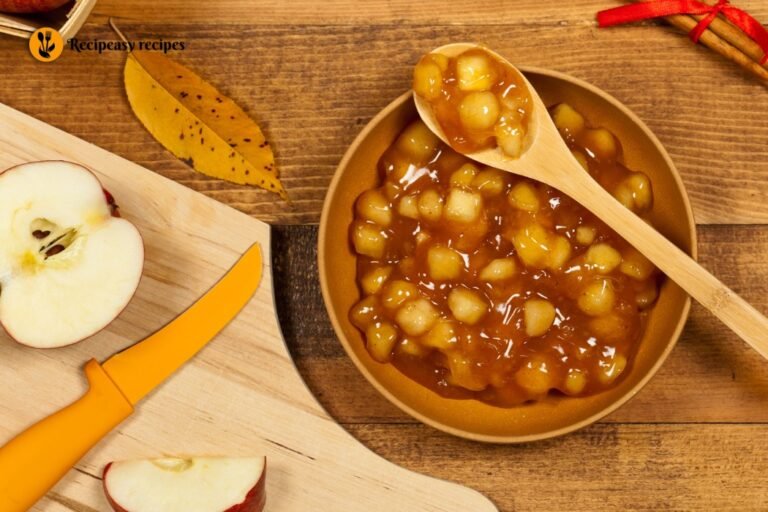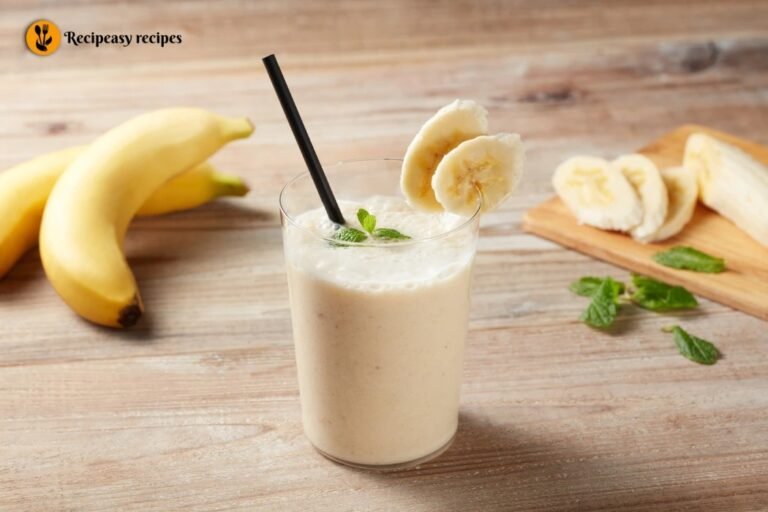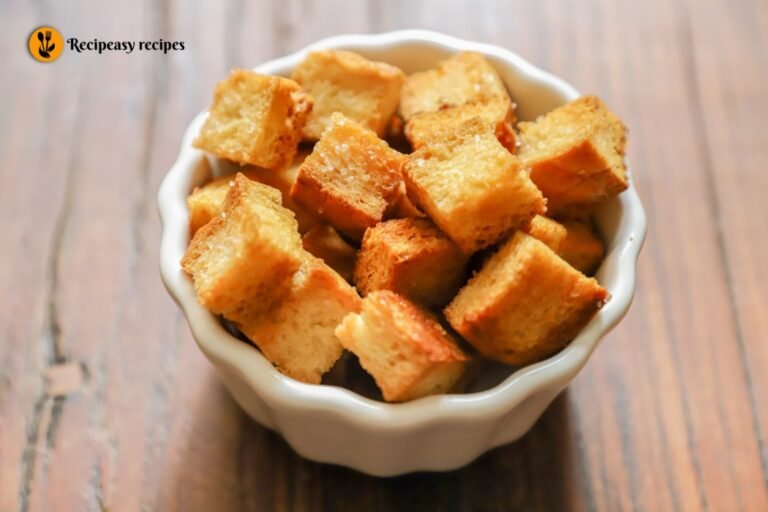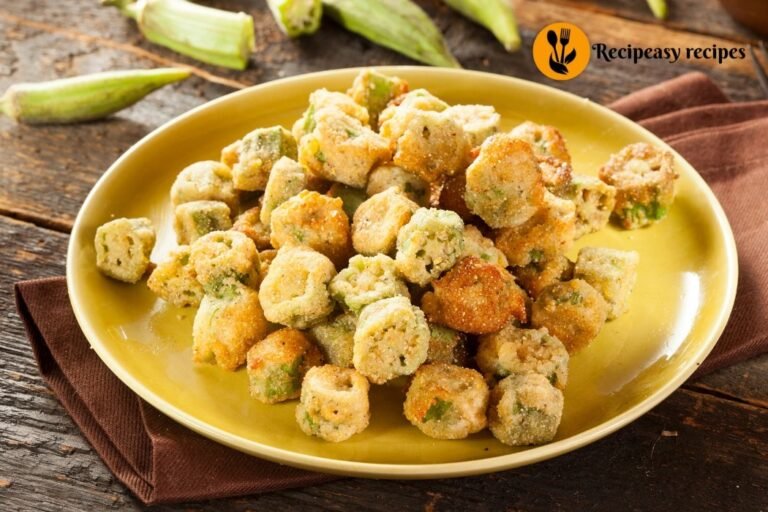Banh Beo Recipe | Vietnamese Steamed Rice Cakes at Home
Banh Beo Recipe is one of those recipes that instantly brings back memories of cozy family gatherings and warm kitchen aromas. I remember watching my grandmother pour delicate batter into tiny saucers, each one carefully placed in a steaming pot. The process felt almost ceremonial, and the result was always a plate full of soft, chewy rice cakes topped with vibrant, savory toppings.
If you’ve ever wanted to try making an authentic Vietnamese dish that’s not too complicated but incredibly rewarding, Banh Beo is a perfect choice. It’s light, flavorful, and offers a beautiful blend of textures in every bite from soft rice cakes to crunchy toppings and tangy fish sauce.
History of Banh Beo Recipe
Banh Beo, a cherished dish from Hue in central Vietnam, reflects the region’s royal culinary heritage. The name combines “Banh” (cake) and “Beo” (water fern), inspired by its shape. Once a royal delicacy, it later became popular street food served in small dishes. Over time, it spread across Vietnam and into homes worldwide. As a result, Banh Beo now holds a lasting place in the country’s cultural and culinary identity.
What is Banh Beo?
Banh Beo is a popular Vietnamese street food originating from Hue, the former imperial capital of Vietnam. These soft rice cakes are prepared by mixing rice flour with tapioca starch and then gently steaming the batter in small dishes. They’re topped with savory ingredients like dried shrimp, scallion oil, and crispy pork skin or shallots, and served with a flavorful fish sauce-based dipping sauce.
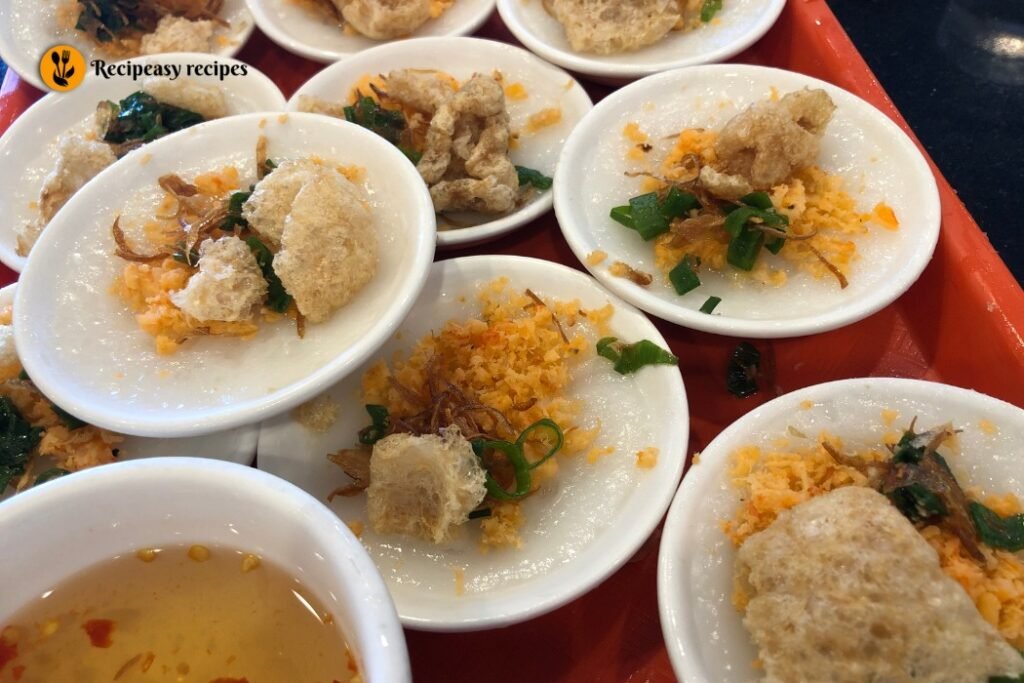
Why Try Banh Beo Recipe?
- It’s naturally gluten-free
- Light and easy to digest
- Full of umami flavors
- A unique appetizer or snack to impress guests
- Lets you explore Vietnamese cuisine in a hands-on way
Equipment You’ll Need
To make Banh Beo at home, gather the following:
- Mixing bowl
- Measuring cups and spoons
- Whisk or spoon
- Small saucers or silicone molds
- Steamer or large pot with a steaming rack
- Blender or food processor
- Small frying pan
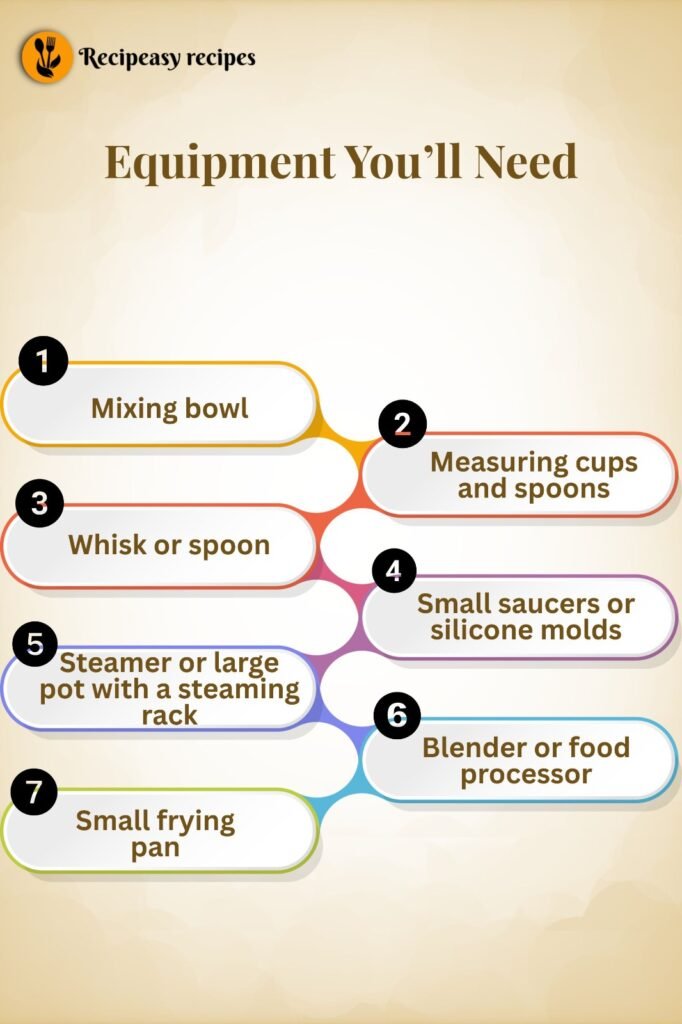
Ingredients
For the batter:
- 1 cup rice flour
- 2 tablespoons tapioca starch
- 1/4 teaspoon salt
- 1 3/4 cups water
For the toppings:
1/2 cup dried shrimp (rehydrated in warm water)
- 2 tablespoons oil
- 2 scallions (chopped)
- Crispy pork skin or fried shallots (optional)
For the sauce:
- 2 tablespoons fish sauce
- 2 tablespoons sugar
- 1 tablespoon lime juice
- 3 tablespoons water
- 1 clove garlic (minced)
- 1 red chili (sliced)
Optional Garnishes:
- Crushed peanuts
- Chili slices
How to Make Banh Beo Recipe Step-by-Step Guide
Banh Beo, or Vietnamese steamed rice cakes, are delicate, savory bites full of flavor and texture. These little cakes are topped with savory dried shrimp, fragrant scallion-infused oil, and crispy toppings, then paired with a sweet and tangy dipping sauce that ties all the flavors together. Here’s a detailed, easy-to-follow recipe to recreate this authentic street food at home.
To start, you’ll need to make the base of the dish the steamed rice cake batter:
- In a large mixing bowl, combine 1 cup rice flour, 2 tablespoons tapioca starch, and a pinch of salt.
- Gradually pour in 2 ½ cups of water, stirring constantly with a whisk until the batter is smooth and free of lumps.
- Allow the batter to sit for about 15 minutes so the starches can fully absorb the water and create a smooth texture.This helps create a smooth, silky texture when steamed.
2. Prepare the Steamer and Dishes
- Set up your steamer by filling a large pot or wide pan with water and bringing it to a gentle boil.
- Place small ceramic or porcelain dishes inside these little dishes are the classic way Banh Beo is traditionally served.
- Preheat the dishes for a few minutes a hot dish helps the batter spread evenly and set nicely.
- Stir the batter again before using.
- Carefully pour 1–2 tablespoons of batter into each heated dish to create a thin layer.
- Cover the steamer with a lid wrapped in a kitchen towel to stop water from dripping onto the cakes. Grind the shrimp into a rough, fluffy powder using a food processor or a mortar and pestle.
- Remove the dishes and let them cool slightly before unmolding the cakes (if needed).
4. Make the Dried Shrimp Topping
This savory topping adds a punch of umami:
- Rinse ½ cup dried shrimp and soak in warm water for 15–20 minutes until rehydrated.
- Drain and pat dry thoroughly.
- Grind the shrimp into a coarse powder using a food processor or mortar and pestle.
- Toast the shrimp powder in a dry nonstick pan over medium heat for 3–5 minutes, until lightly crispy and fragrant. Set aside.
A fragrant finishing touch:
- Finely chop 2–3 stalks of green onions.
- Gently heat 3 tablespoons of neutral oil in a small pan over low flame until warm and shimmering.
- Add the green onions and sauté for 20–30 seconds, just until softened and aromatic (avoid browning). Set aside.
6. Mix the Dipping Sauce (Nuoc Cham)
This classic sauce ties everything together:
- In a bowl, combine:
- 2 tablespoons fish sauce
2 tablespoons sugar
2 tablespoons lime juice or vinegar
4 tablespoons warm water
1 clove minced garlic
- 1 sliced chili (optional)
- 2 tablespoons fish sauce
- Stir well until the sugar dissolves completely. Taste and adjust for your preferred balance of sweet, salty, sour, and spicy.
Now for the fun part:
- Gently loosen the cooled rice cakes from the dishes if needed.
- Top each one with a spoonful of dried shrimp powder.
- Add crispy pork skin, fried shallots, or both for texture and depth.
- Drizzle with the scallion oil for aroma and richness.
- Arrange the rice cakes on a serving plate after adding the toppings.
- You can either serve them with Nuoc Cham dipping sauce on the side or drizzle a bit of the sauce over each cake right before serving.
9. Optional Garnishes for Extra Flavor
Elevate your Banh Beo presentation and taste with:
- Thinly sliced fresh red chili for color and heat
- Crushed roasted peanuts for nuttiness
- A pinch of fried garlic for crunch and aroma
Nutrition Information (Per Serving Approx.)
- Calories: 180
- Protein: 6g
- Fat: 4g
- Carbohydrates: 28g
- Fiber: 1g
- Sodium: 320mg
How to Serve Banh Beo
Banh Beo is traditionally served in the same saucers it’s steamed in. You can either:
- Drizzle sauce on top and serve directly, or
- Allow guests to spoon sauce individually as they eat
Pair with iced tea or a light soup to complete the meal.
FAQs
Can I use store-bought shrimp powder?
Yes, but freshly made topping has better flavor and texture.
What if I don’t have small saucers?
You can use silicone cupcake molds or any small heatproof bowls.
Can Banh Beo be made ahead of time?
Yes, but they are best served fresh. You can reheat them by steaming for 2-3 minutes.
Is this dish spicy?
No, unless you add chili slices. The sauce is more tangy and savory.
Can I make it vegan?
Yes! Skip the shrimp and fish sauce. Use soy sauce and mushroom powder instead.
Conclusion
Banh Beo is more than just a snack it’s a representation of Vietnamese tradition, flavor, and artistry. In fact, each component, from the rice cake to the savory toppings, reflects balance and beauty. Therefore, it continues to capture hearts both locally and globally. As a result, its presence in both street stalls and home kitchens proves its versatility. Above all, Banh Beo shows how simplicity and tradition can come together to create something truly special.
If you’re eager to explore authentic Vietnamese cuisine, Banh Beo offers a delightful starting point. Moreover, it’s easy to make at home with just a few ingredients.Whether you’re a seasoned cook or a curious beginner, this dish promises flavor and satisfaction. In addition, sharing it with family or friends adds to the experience.Ultimately, Banh Beo is not just food it’s a connection to culture and heritage.
Banh Beo Recipe | Vietnamese Steamed Rice Cakes at Home
Course: SnacksCuisine: VietnameseDifficulty: Medium4
servings20
minutes30
minutes180 kcal per serving
kcalSoft, chewy Vietnamese steamed rice cakes topped with dried shrimp, scallion oil & crispy toppings. A light, flavorful street food from Hue.
Ingredients
For the batter:
1 cup rice flour
2 tablespoons tapioca starch
1/4 teaspoon salt
1 3/4 cups water
- For the toppings:
1/2 cup dried shrimp (rehydrated in warm water)
2 tablespoons oil
2 scallions (chopped)
Crispy pork skin or fried shallots (optional)
- For the sauce:
2 tablespoons fish sauce
2 tablespoons sugar
1 tablespoon lime juice
3 tablespoons water
1 clove garlic (minced)
1 red chili (sliced)
- Optional Garnishes:
Crushed peanuts
Chili slices
Directions
- Make the Batter
To start, you’ll need to make the base of the dish the steamed rice cake batter:
In a large mixing bowl, combine 1 cup rice flour, 2 tablespoons tapioca starch, and a pinch of salt.
Gradually pour in 2 ½ cups of water, stirring constantly with a whisk until the batter is smooth and free of lumps.
Allow the batter to sit for about 15 minutes so the starches can fully absorb the water and create a smooth texture.This helps create a smooth, silky texture when steamed. - Prepare the Steamer and Dishes
Set up your steamer by filling a large pot or wide pan with water and bringing it to a gentle boil.
Place small ceramic or porcelain dishes inside these little dishes are the classic way Banh Beo is traditionally served.
Preheat the dishes for a few minutes a hot dish helps the batter spread evenly and set nicely. - Steam the Rice Cakes
Stir the batter again before using.
Carefully pour 1–2 tablespoons of batter into each heated dish to create a thin layer.
Cover the steamer with a lid wrapped in a kitchen towel to stop water from dripping onto the cakes. Grind the shrimp into a rough, fluffy powder using a food processor or a mortar and pestle.
Remove the dishes and let them cool slightly before unmolding the cakes (if needed). - Make the Dried Shrimp Topping
This savory topping adds a punch of umami:
Rinse ½ cup dried shrimp and soak in warm water for 15–20 minutes until rehydrated.
Drain and pat dry thoroughly.
Grind the shrimp into a coarse powder using a food processor or mortar and pestle.
Toast the shrimp powder in a dry nonstick pan over medium heat for 3–5 minutes, until lightly crispy and fragrant. Set aside. - Prepare the Scallion Oil
A fragrant finishing touch:
Finely chop 2–3 stalks of green onions.
Gently heat 3 tablespoons of neutral oil in a small pan over low flame until warm and shimmering.
Add the green onions and sauté for 20–30 seconds, just until softened and aromatic (avoid browning). Set aside. - Mix the Dipping Sauce (Nuoc Cham)
This classic sauce ties everything together:
In a bowl, combine:
2 tablespoons fish sauce
2 tablespoons sugar
2 tablespoons lime juice or vinegar
4 tablespoons warm water
1 clove minced garlic
1 sliced chili (optional)
Stir well until the sugar dissolves completely. Taste and adjust for your preferred balance of sweet, salty, sour, and spicy. - Assemble the Banh Beo
Now for the fun part:
Gently loosen the cooled rice cakes from the dishes if needed.
Top each one with a spoonful of dried shrimp powder.
Add crispy pork skin, fried shallots, or both for texture and depth.
Drizzle with the scallion oil for aroma and richness. - Serve with Dipping Sauce
Arrange the rice cakes on a serving plate after adding the toppings.
You can either serve them with Nuoc Cham dipping sauce on the side or drizzle a bit of the sauce over each cake right before serving. - Optional Garnishes for Extra Flavor
Elevate your Banh Beo presentation and taste with:
Thinly sliced fresh red chili for color and heat
Crushed roasted peanuts for nuttiness
A pinch of fried garlic for crunch and aroma
Notes
- Use silicone molds for easy removal.
- Stir batter before pouring as starch settles.
- Best served fresh.
